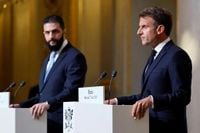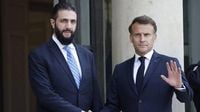On May 7, 2025, French President Emmanuel Macron welcomed Syrian President Ahmed al-Charaa to the Elysee Palace for his first official visit to Europe since taking power after the fall of Bashar al-Assad in December 2024. This meeting comes at a time of significant tension and controversy, given the recent violence in Syria that has resulted in over 1,700 deaths, predominantly among the Alawite community, and ongoing interfaith conflicts involving the Druze.
During a joint press conference, Macron emphasized the importance of protecting all Syrians, stating, "I count on you to do everything to ensure the protection of all Syrians without exception, regardless of their origin, religion, confession, or opinions." This call to action was underscored by the backdrop of recent massacres and documented abuses that have raised questions about the new government’s ability to maintain stability and control extremist factions.
Macron also urged al-Charaa to ensure that those responsible for the interfaith violence are prosecuted, advocating for the European Union to systematically sanction the perpetrators of these crimes. He expressed a desire for a gradual lifting of European economic sanctions against Syria, contingent upon the stabilization of the country under al-Charaa’s leadership. "Nothing justifies the maintenance of sanctions, as they are currently imposed on the people, not on those who have massacred them," al-Charaa argued, highlighting the economic challenges facing Syria, where 90% of the population lives below the poverty line, according to the United Nations.
The meeting also addressed the complex geopolitical dynamics in the region. Macron called on the United States to expedite the lifting of sanctions while maintaining military operations against the Islamic State in Syria. He remarked, "The stability in Syria is good for the entire region and for our security. We must ensure that we do not endanger our interests by withdrawing too quickly." This reflects a nuanced approach to the ongoing conflict, recognizing the need for international cooperation in addressing both security concerns and humanitarian needs.
Al-Charaa, who previously led the Islamist group Hayat Tahrir al-Sham, has been under scrutiny due to his past affiliations with extremist organizations. However, he sought to distance himself from terrorism during the press conference, stating, "We have nothing to do with the criminal acts that have occurred in Syria and abroad; our goal was to target the criminal regime." His assertion of prioritizing the safety of all Syrians was met with skepticism by critics, particularly from the French right and far-right, who condemned Macron for hosting a leader with such a controversial background.
Marine Le Pen, leader of the National Rally, expressed outrage over the invitation, labeling al-Charaa as a "jihadist who has passed through ISIS and Al-Qaeda." Similarly, Laurent Wauquiez, head of the Republican deputies, denounced the meeting as a "grave error," asserting that France should not engage with leaders who have ties to organizations that threaten national security.
Despite the backlash, Macron defended his decision as a necessary step towards engaging with the new Syrian leadership. He characterized the criticisms as political posturing, stating, "It is a question of responsibility to engage in dialogue with the new authorities, especially when it comes to addressing the complex issues of security and humanitarian aid in the region." He emphasized that the dialogue does not equate to endorsing the government but rather holding it accountable for its actions.
In response to the recent violence, which included clashes with the Druze and attacks on Alawite communities, Macron reiterated the need for accountability and justice. He stated, "We cannot ignore the recent outbreaks of violence; a path to civil peace and concord must be found. This is a transition that must account for the entirety of Syrian civil society." This statement reflects a commitment to a comprehensive approach to peacebuilding in Syria, acknowledging the diverse fabric of its society.
As the meeting concluded, both leaders expressed hope for a more stable and secure Syria. Al-Charaa affirmed that there would be no room for sectarian confrontations in the country, and he reiterated his commitment to being a reliable partner in the fight against terrorism. The international community will be watching closely as Syria navigates this critical juncture in its history, with the potential for both significant challenges and opportunities on the horizon.
Macron’s outreach to al-Charaa represents a pivotal moment in Franco-Syrian relations, aiming to re-establish diplomatic ties that have been strained for over a decade. The French presidency has made it clear that while it seeks to engage with the new Syrian government, it will do so with a firm commitment to human rights and the protection of all communities within Syria.


